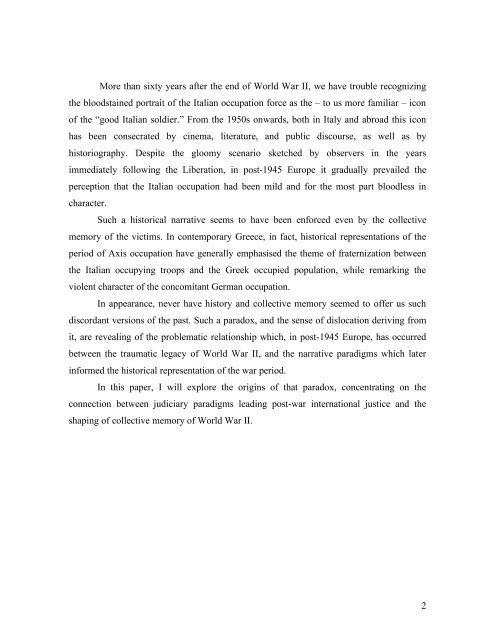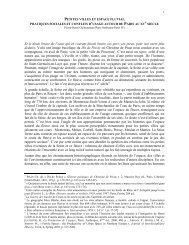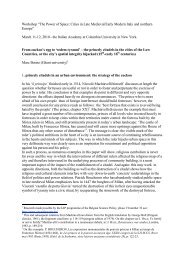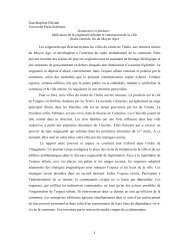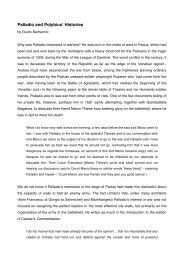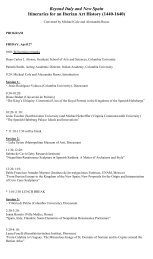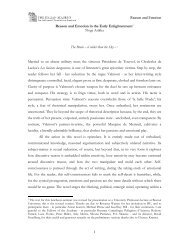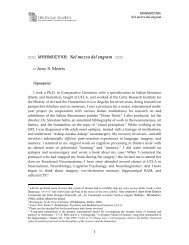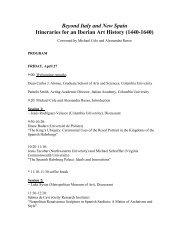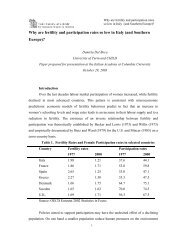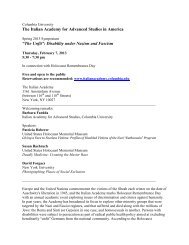A Discussion on Italian War Crimes in World War II - The Italian ...
A Discussion on Italian War Crimes in World War II - The Italian ...
A Discussion on Italian War Crimes in World War II - The Italian ...
Create successful ePaper yourself
Turn your PDF publications into a flip-book with our unique Google optimized e-Paper software.
More than sixty years after the end of <strong>World</strong> <strong>War</strong> <strong>II</strong>, we have trouble recogniz<strong>in</strong>g<br />
the bloodsta<strong>in</strong>ed portrait of the <strong>Italian</strong> occupati<strong>on</strong> force as the – to us more familiar – ic<strong>on</strong><br />
of the “good <strong>Italian</strong> soldier.” From the 1950s <strong>on</strong>wards, both <strong>in</strong> Italy and abroad this ic<strong>on</strong><br />
has been c<strong>on</strong>secrated by c<strong>in</strong>ema, literature, and public discourse, as well as by<br />
historiography. Despite the gloomy scenario sketched by observers <strong>in</strong> the years<br />
immediately follow<strong>in</strong>g the Liberati<strong>on</strong>, <strong>in</strong> post-1945 Europe it gradually prevailed the<br />
percepti<strong>on</strong> that the <strong>Italian</strong> occupati<strong>on</strong> had been mild and for the most part bloodless <strong>in</strong><br />
character.<br />
Such a historical narrative seems to have been enforced even by the collective<br />
memory of the victims. In c<strong>on</strong>temporary Greece, <strong>in</strong> fact, historical representati<strong>on</strong>s of the<br />
period of Axis occupati<strong>on</strong> have generally emphasised the theme of fraternizati<strong>on</strong> between<br />
the <strong>Italian</strong> occupy<strong>in</strong>g troops and the Greek occupied populati<strong>on</strong>, while remark<strong>in</strong>g the<br />
violent character of the c<strong>on</strong>comitant German occupati<strong>on</strong>.<br />
In appearance, never have history and collective memory seemed to offer us such<br />
discordant versi<strong>on</strong>s of the past. Such a paradox, and the sense of dislocati<strong>on</strong> deriv<strong>in</strong>g from<br />
it, are reveal<strong>in</strong>g of the problematic relati<strong>on</strong>ship which, <strong>in</strong> post-1945 Europe, has occurred<br />
between the traumatic legacy of <strong>World</strong> <strong>War</strong> <strong>II</strong>, and the narrative paradigms which later<br />
<strong>in</strong>formed the historical representati<strong>on</strong> of the war period.<br />
In this paper, I will explore the orig<strong>in</strong>s of that paradox, c<strong>on</strong>centrat<strong>in</strong>g <strong>on</strong> the<br />
c<strong>on</strong>necti<strong>on</strong> between judiciary paradigms lead<strong>in</strong>g post-war <strong>in</strong>ternati<strong>on</strong>al justice and the<br />
shap<strong>in</strong>g of collective memory of <strong>World</strong> <strong>War</strong> <strong>II</strong>.<br />
2


